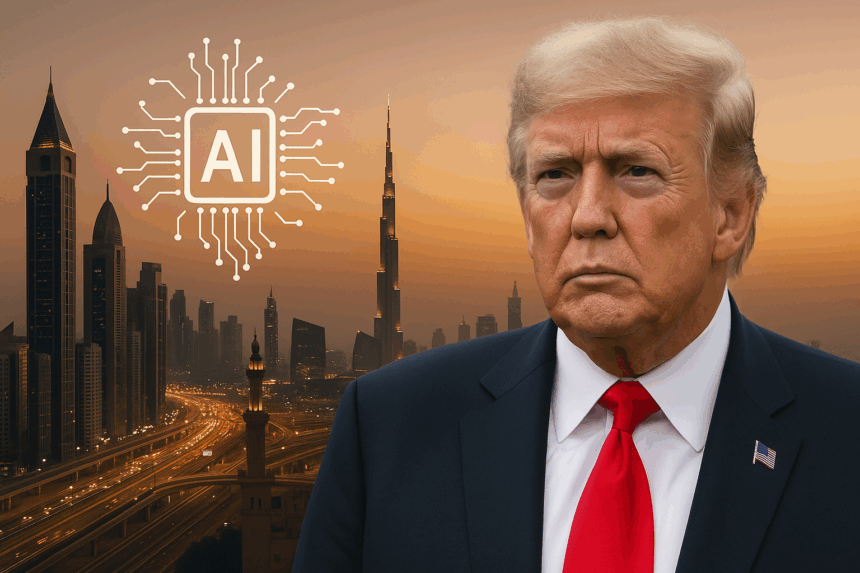During President Donald Trump’s visit to Gulf states, several American technology firms secured sizable deals related to artificial intelligence (AI). These deals are part of a strategy to bolster the U.S. presence in the Middle East. As part of this strategy, Trump promoted a substantial $600 billion commitment from Saudi Arabia to strengthen the ties between the two regions through AI investments. These agreements represent the growing importance of AI dominance in economic and geopolitical dynamics.
What’s Happening & Why This Matters
During his tour, Trump announced the first batch of deals, which include significant contracts with tech giants like Nvidia and Cisco. Nvidia, for example, has agreed to supply hundreds of thousands of its state-of-the-art AI chips to Saudi Arabia. A key part of the agreement involves a first shipment of 18,000 “Blackwell” chips to Humain, a Saudi Arabian sovereign wealth fund-owned AI startup.
Cisco, meanwhile, has signed a deal with G42, an AI company based in the United Arab Emirates (UAE), to help the country bolster its AI sector. These agreements are part of efforts to position the Gulf states as global leaders in AI. Saudi Arabia aims to reduce its dependence on oil revenue and establish itself as a key player in digital transformation and cloud computing.

These deals are a win for U.S. tech firms and provide Gulf states like Saudi Arabia and the UAE with a strategic opportunity to advance their ambitions of becoming AI hubs. Saudi Arabia has made significant investments to develop its own AI infrastructure, with a notable example being the launch of Humain, an AI initiative designed to drive technological progress within the kingdom.
In return, the deals also benefit U.S. companies. DataVolt, a Saudi Arabian firm, is investing $20 billion in AI data centers and energy infrastructure in the U.S., while major players like Google, Oracle, Salesforce, and Advanced Micro Devices (AMD) are investing $80 billion in transformative technologies across both regions.
For companies like Nvidia, the demand for cutting-edge AI chips continues to rise globally, especially as AI technologies such as deep learning and GPU cloud computing become more integral to industries worldwide. Nvidia, in particular, has gained global attention for its role in advancing AI, with its state-of-the-art semiconductor platforms at the forefront of AI-driven progress.
However, there’s an underlying contrast in these deals. While the U.S. is opening doors for AI trade with Gulf States, strict regulations regarding selling advanced technology to China remain. The U.S. government has imposed tight restrictions on selling Nvidia’s most recent chips to Chinese firms, underscoring the growing competition for AI supremacy between the U.S. and China.
Impact
These agreements are an AI trend in the future of technology, not just in the U.S., but globally. For the Gulf states, particularly Saudi Arabia and the UAE, embracing AI is part of their ambitious long-term economic plans to diversify beyond oil dependence. The commitment to establishing AI as a pillar of their economies transforms the region’s outlook, positioning it as a critical global player in the AI arms race.
These deals boost the U.S. tech sector. By expanding into the Middle East, U.S. tech firms stand to increase their global influence and cement their positions in the competitive AI space. The Gulf States’ collaborations also bring new investment opportunities for companies such as Nvidia, Oracle, and Cisco, potentially opening up new AI markets.

The importance of this collaboration can’t be overstated. As AI grows, it is expected to drive growth in various sectors, from finance to healthcare to national security. With such transformative potential, the partnerships between the U.S. and Gulf states pave the way for further digital infrastructure advancements, solidifying the region’s place in the global tech ecosystem.
TF Summary: What’s Next
The partnerships forged between U.S. tech firms and Gulf states are beginning a new chapter in the AI-driven future. As Saudi Arabia and the UAE push to become global AI leaders, the opportunities for U.S. tech companies to expand their influence are immense. However, the geopolitics remains fluid, with the competition between the U.S. and China only intensifying.
As these deals are executed, TF predicts further advancements in AI, with both regions playing crucial roles in the future of transformative technology. As the Gulf states establish their own AI ecosystems, seeing how these partnerships and innovations emerge will be fascinating.
— Text-to-Speech (TTS) provided by gspeech


